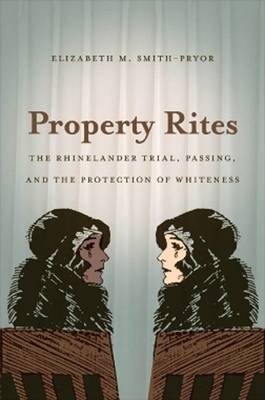
Property Rites
The Rhinelander Trial, Passing, and the Protection of Whiteness
Seiten
2009
|
New edition
The University of North Carolina Press (Verlag)
978-0-8078-3268-4 (ISBN)
The University of North Carolina Press (Verlag)
978-0-8078-3268-4 (ISBN)
- Titel ist leider vergriffen;
keine Neuauflage - Artikel merken
In 1925 Leonard Rhinelander, the youngest son of a wealthy New York society family, sued to end his marriage to Alice Jones, a former domestic servant and the daughter of a 'colored' cabman. This title explains legal history, a day-by-day narrative of the trial itself, and analyses of the trial's place in the culture of the 1920s North.
This title provides transcripts that offer new insights on the infamous trial. In 1925 Leonard Rhinelander, the youngest son of a wealthy New York society family, sued to end his marriage to Alice Jones, a former domestic servant and the daughter of a 'colored' cabman. After being married only one month, Rhinelander pressed for the dissolution of his marriage on the grounds that his wife had lied to him about her racial background. The subsequent marital annulment trial became a massive public spectacle, not only in New York but across the nation - despite the fact that the state had never outlawed interracial marriage.Elizabeth Smith-Pryor makes extensive use of trial transcripts, in addition to contemporary newspaper coverage and archival sources, to explore why Leonard Rhinelander was allowed his day in court. She moves fluidly between legal history, a day-by-day narrative of the trial itself, and analyses of the trial's place in the culture of the 1920s North to show how notions of race, property, and the law were - and are - inextricably intertwined.
This title provides transcripts that offer new insights on the infamous trial. In 1925 Leonard Rhinelander, the youngest son of a wealthy New York society family, sued to end his marriage to Alice Jones, a former domestic servant and the daughter of a 'colored' cabman. After being married only one month, Rhinelander pressed for the dissolution of his marriage on the grounds that his wife had lied to him about her racial background. The subsequent marital annulment trial became a massive public spectacle, not only in New York but across the nation - despite the fact that the state had never outlawed interracial marriage.Elizabeth Smith-Pryor makes extensive use of trial transcripts, in addition to contemporary newspaper coverage and archival sources, to explore why Leonard Rhinelander was allowed his day in court. She moves fluidly between legal history, a day-by-day narrative of the trial itself, and analyses of the trial's place in the culture of the 1920s North to show how notions of race, property, and the law were - and are - inextricably intertwined.
ELIZABETH SMITH-PRYOR is assistant professor of history at Kent State University. She practiced law in New York for six years.
| Verlagsort | Chapel Hill |
|---|---|
| Sprache | englisch |
| Maße | 156 x 235 mm |
| Themenwelt | Geisteswissenschaften ► Geschichte ► Regional- / Ländergeschichte |
| Geschichte ► Teilgebiete der Geschichte ► Kulturgeschichte | |
| Recht / Steuern ► EU / Internationales Recht | |
| Recht / Steuern ► Öffentliches Recht ► Verfassungsrecht | |
| Recht / Steuern ► Privatrecht / Bürgerliches Recht | |
| Sozialwissenschaften ► Ethnologie | |
| Sozialwissenschaften ► Soziologie | |
| ISBN-10 | 0-8078-3268-5 / 0807832685 |
| ISBN-13 | 978-0-8078-3268-4 / 9780807832684 |
| Zustand | Neuware |
| Haben Sie eine Frage zum Produkt? |
Mehr entdecken
aus dem Bereich
aus dem Bereich
der stille Abschied vom bäuerlichen Leben in Deutschland
Buch | Hardcover (2023)
C.H.Beck (Verlag)
CHF 32,15
vom Mittelalter bis zur Gegenwart
Buch | Softcover (2024)
C.H.Beck (Verlag)
CHF 16,80


